Evaluating IMF's Influence on Global Trade: International Business BA
VerifiedAdded on 2023/04/20
|17
|4086
|191
Essay
AI Summary
This paper examines the role of the International Monetary Fund (IMF) in fostering global trade, particularly in the 21st century. It highlights the IMF's activities, including surveillance, capacity building, and lending, aimed at promoting financial stability and economic development worldwide. The analysis details how the IMF collects and disseminates information on international trade and national economies to inform monetary and fiscal policies. It also discusses the IMF's engagement with developing markets and low-income nations, emphasizing the organization's efforts to enhance transparency, economic governance, and financial system integrity. The paper concludes that the IMF plays a crucial role in supporting and shaping global trade through various initiatives and reforms.
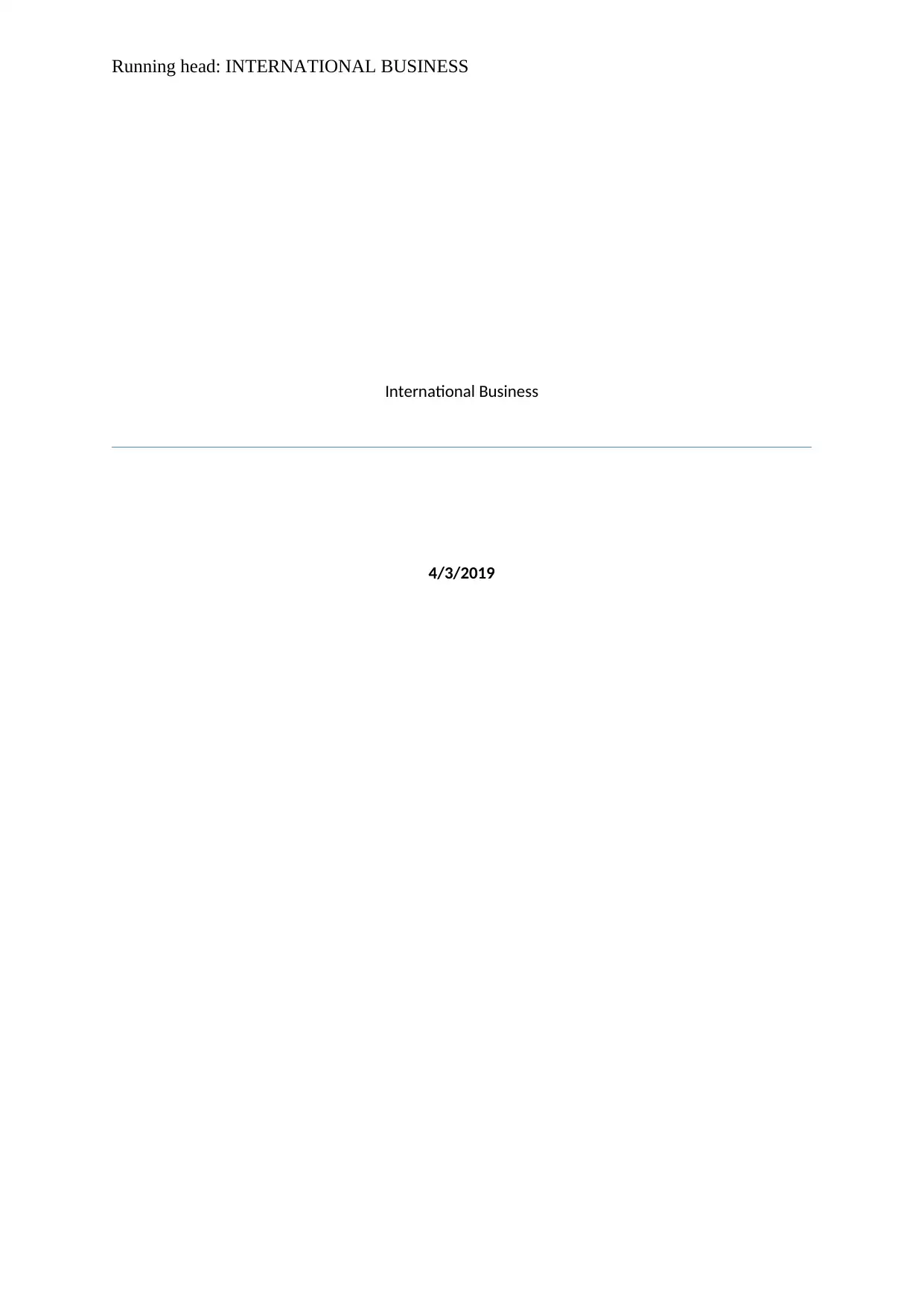
Running head: INTERNATIONAL BUSINESS
International Business
4/3/2019
International Business
4/3/2019
Paraphrase This Document
Need a fresh take? Get an instant paraphrase of this document with our AI Paraphraser
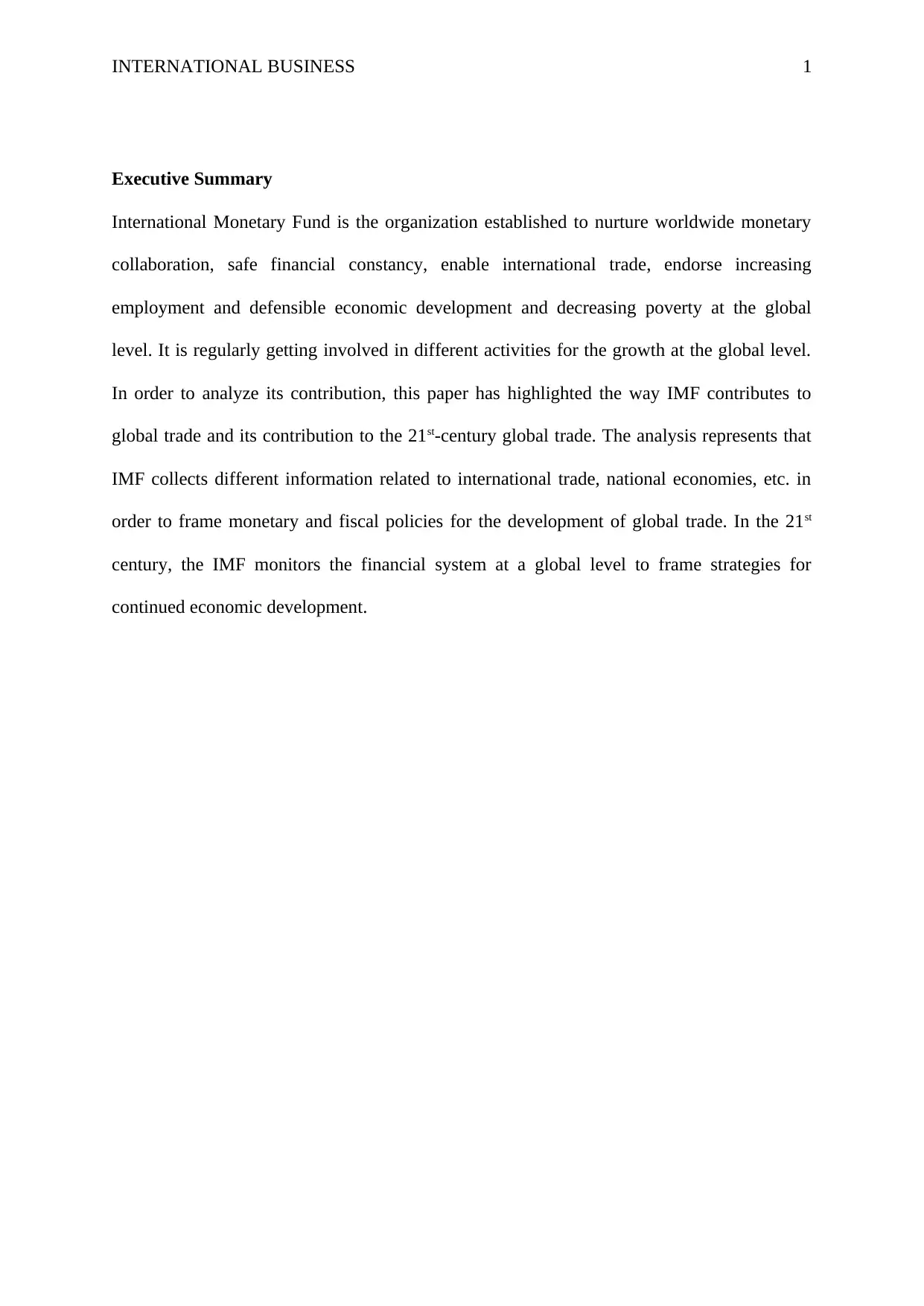
INTERNATIONAL BUSINESS 1
Executive Summary
International Monetary Fund is the organization established to nurture worldwide monetary
collaboration, safe financial constancy, enable international trade, endorse increasing
employment and defensible economic development and decreasing poverty at the global
level. It is regularly getting involved in different activities for the growth at the global level.
In order to analyze its contribution, this paper has highlighted the way IMF contributes to
global trade and its contribution to the 21st-century global trade. The analysis represents that
IMF collects different information related to international trade, national economies, etc. in
order to frame monetary and fiscal policies for the development of global trade. In the 21st
century, the IMF monitors the financial system at a global level to frame strategies for
continued economic development.
Executive Summary
International Monetary Fund is the organization established to nurture worldwide monetary
collaboration, safe financial constancy, enable international trade, endorse increasing
employment and defensible economic development and decreasing poverty at the global
level. It is regularly getting involved in different activities for the growth at the global level.
In order to analyze its contribution, this paper has highlighted the way IMF contributes to
global trade and its contribution to the 21st-century global trade. The analysis represents that
IMF collects different information related to international trade, national economies, etc. in
order to frame monetary and fiscal policies for the development of global trade. In the 21st
century, the IMF monitors the financial system at a global level to frame strategies for
continued economic development.
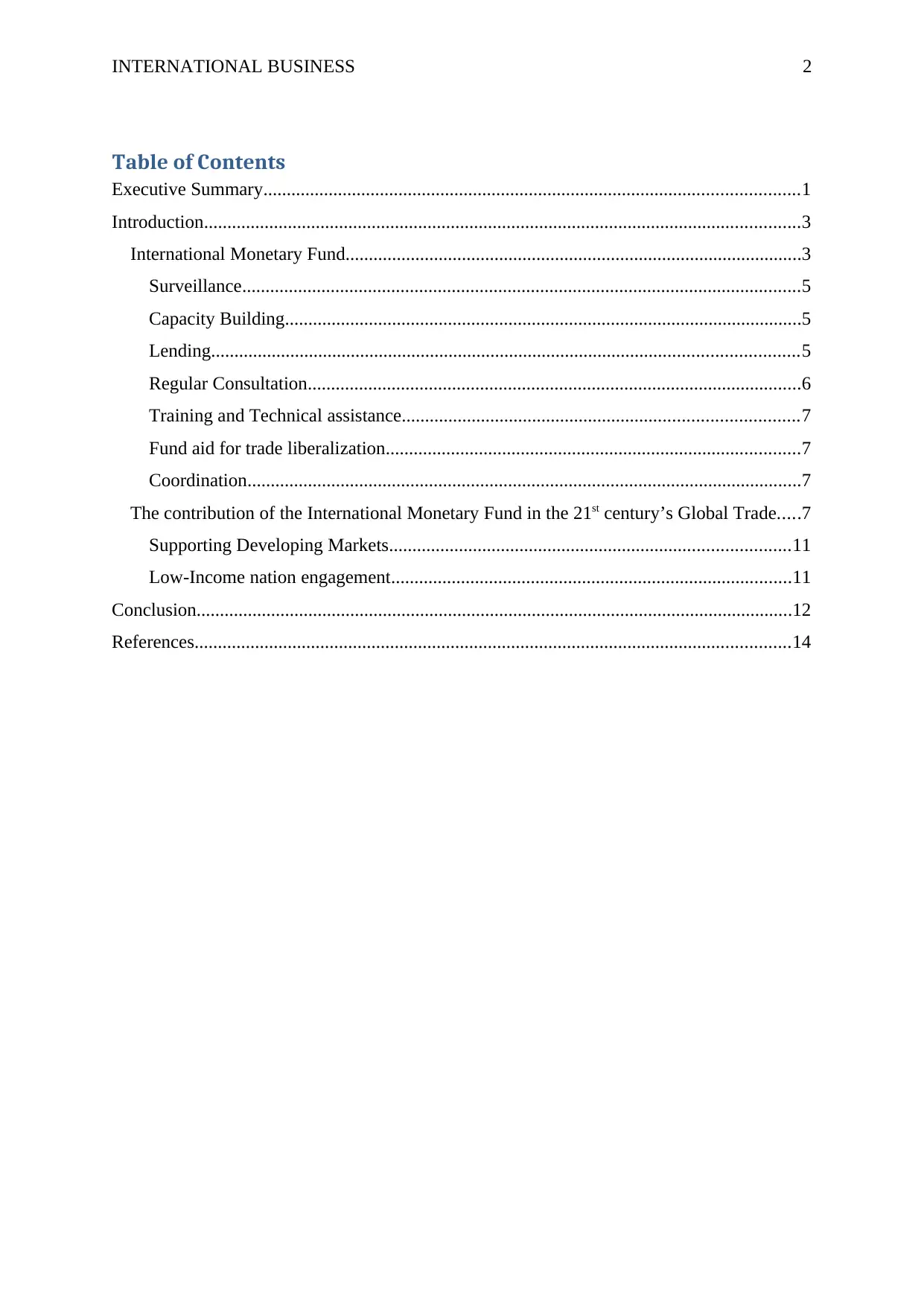
INTERNATIONAL BUSINESS 2
Table of Contents
Executive Summary...................................................................................................................1
Introduction................................................................................................................................3
International Monetary Fund..................................................................................................3
Surveillance........................................................................................................................5
Capacity Building...............................................................................................................5
Lending..............................................................................................................................5
Regular Consultation..........................................................................................................6
Training and Technical assistance.....................................................................................7
Fund aid for trade liberalization.........................................................................................7
Coordination.......................................................................................................................7
The contribution of the International Monetary Fund in the 21st century’s Global Trade.....7
Supporting Developing Markets......................................................................................11
Low-Income nation engagement......................................................................................11
Conclusion................................................................................................................................12
References................................................................................................................................14
Table of Contents
Executive Summary...................................................................................................................1
Introduction................................................................................................................................3
International Monetary Fund..................................................................................................3
Surveillance........................................................................................................................5
Capacity Building...............................................................................................................5
Lending..............................................................................................................................5
Regular Consultation..........................................................................................................6
Training and Technical assistance.....................................................................................7
Fund aid for trade liberalization.........................................................................................7
Coordination.......................................................................................................................7
The contribution of the International Monetary Fund in the 21st century’s Global Trade.....7
Supporting Developing Markets......................................................................................11
Low-Income nation engagement......................................................................................11
Conclusion................................................................................................................................12
References................................................................................................................................14
⊘ This is a preview!⊘
Do you want full access?
Subscribe today to unlock all pages.

Trusted by 1+ million students worldwide
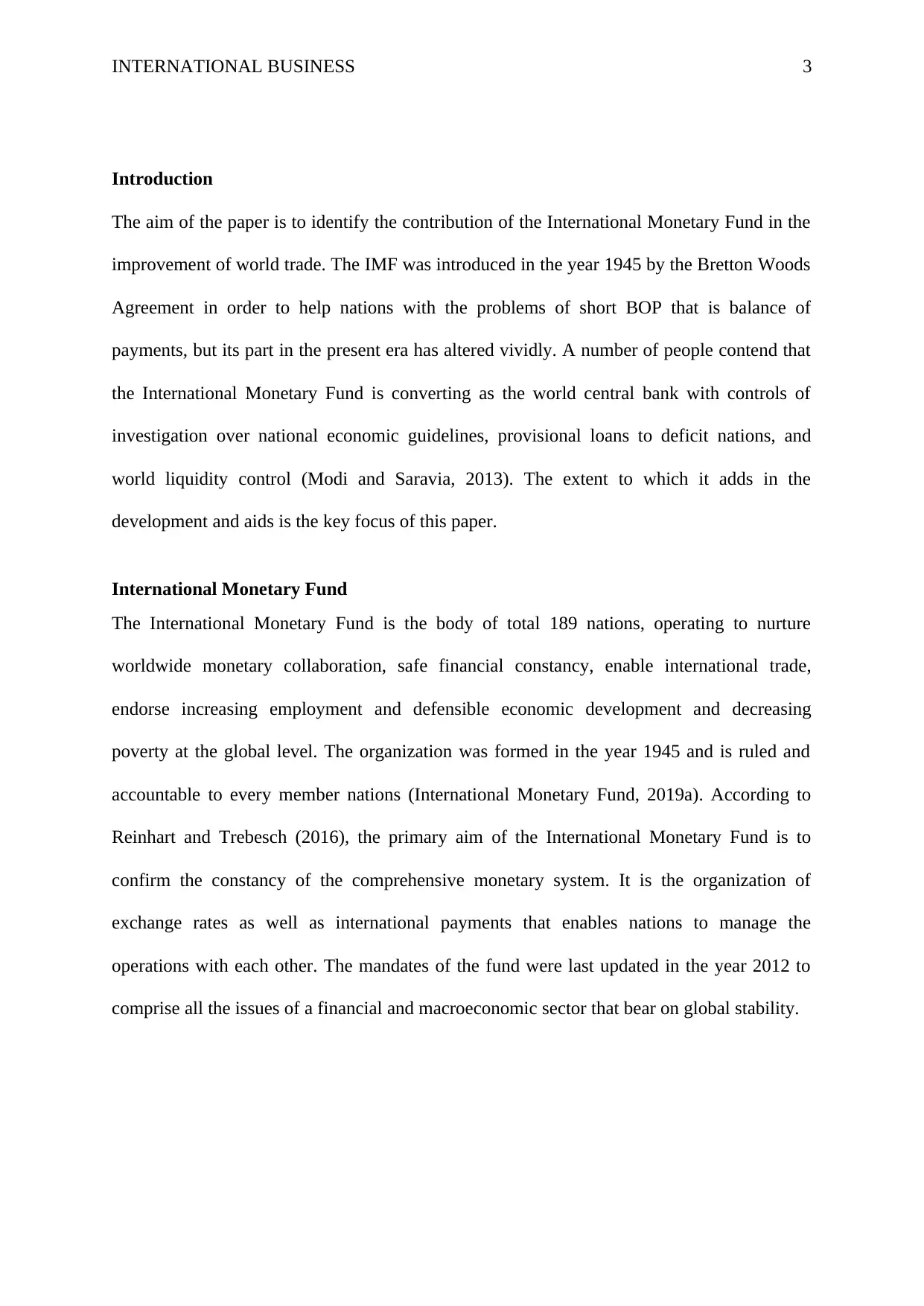
INTERNATIONAL BUSINESS 3
Introduction
The aim of the paper is to identify the contribution of the International Monetary Fund in the
improvement of world trade. The IMF was introduced in the year 1945 by the Bretton Woods
Agreement in order to help nations with the problems of short BOP that is balance of
payments, but its part in the present era has altered vividly. A number of people contend that
the International Monetary Fund is converting as the world central bank with controls of
investigation over national economic guidelines, provisional loans to deficit nations, and
world liquidity control (Modi and Saravia, 2013). The extent to which it adds in the
development and aids is the key focus of this paper.
International Monetary Fund
The International Monetary Fund is the body of total 189 nations, operating to nurture
worldwide monetary collaboration, safe financial constancy, enable international trade,
endorse increasing employment and defensible economic development and decreasing
poverty at the global level. The organization was formed in the year 1945 and is ruled and
accountable to every member nations (International Monetary Fund, 2019a). According to
Reinhart and Trebesch (2016), the primary aim of the International Monetary Fund is to
confirm the constancy of the comprehensive monetary system. It is the organization of
exchange rates as well as international payments that enables nations to manage the
operations with each other. The mandates of the fund were last updated in the year 2012 to
comprise all the issues of a financial and macroeconomic sector that bear on global stability.
Introduction
The aim of the paper is to identify the contribution of the International Monetary Fund in the
improvement of world trade. The IMF was introduced in the year 1945 by the Bretton Woods
Agreement in order to help nations with the problems of short BOP that is balance of
payments, but its part in the present era has altered vividly. A number of people contend that
the International Monetary Fund is converting as the world central bank with controls of
investigation over national economic guidelines, provisional loans to deficit nations, and
world liquidity control (Modi and Saravia, 2013). The extent to which it adds in the
development and aids is the key focus of this paper.
International Monetary Fund
The International Monetary Fund is the body of total 189 nations, operating to nurture
worldwide monetary collaboration, safe financial constancy, enable international trade,
endorse increasing employment and defensible economic development and decreasing
poverty at the global level. The organization was formed in the year 1945 and is ruled and
accountable to every member nations (International Monetary Fund, 2019a). According to
Reinhart and Trebesch (2016), the primary aim of the International Monetary Fund is to
confirm the constancy of the comprehensive monetary system. It is the organization of
exchange rates as well as international payments that enables nations to manage the
operations with each other. The mandates of the fund were last updated in the year 2012 to
comprise all the issues of a financial and macroeconomic sector that bear on global stability.
Paraphrase This Document
Need a fresh take? Get an instant paraphrase of this document with our AI Paraphraser
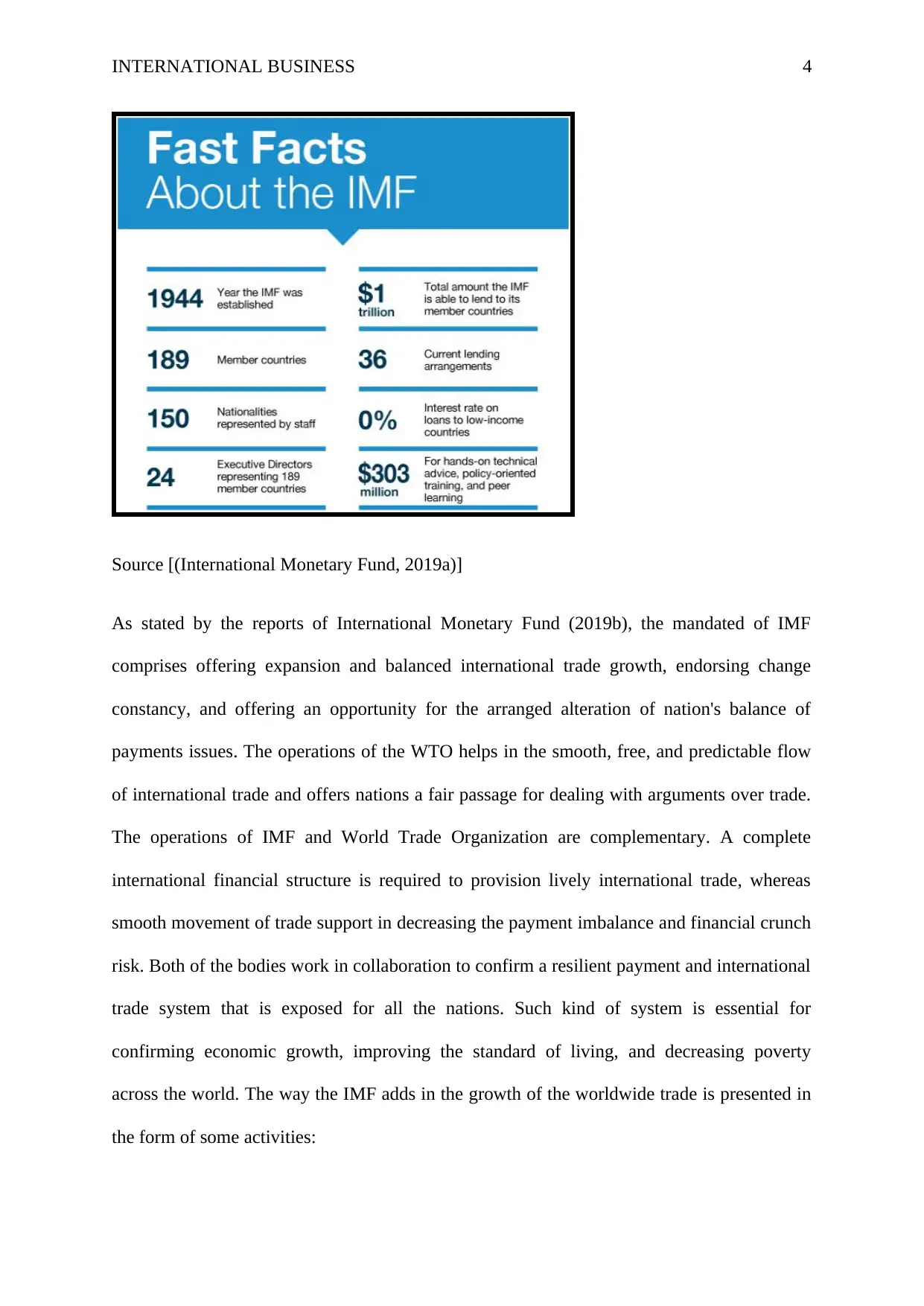
INTERNATIONAL BUSINESS 4
Source [(International Monetary Fund, 2019a)]
As stated by the reports of International Monetary Fund (2019b), the mandated of IMF
comprises offering expansion and balanced international trade growth, endorsing change
constancy, and offering an opportunity for the arranged alteration of nation's balance of
payments issues. The operations of the WTO helps in the smooth, free, and predictable flow
of international trade and offers nations a fair passage for dealing with arguments over trade.
The operations of IMF and World Trade Organization are complementary. A complete
international financial structure is required to provision lively international trade, whereas
smooth movement of trade support in decreasing the payment imbalance and financial crunch
risk. Both of the bodies work in collaboration to confirm a resilient payment and international
trade system that is exposed for all the nations. Such kind of system is essential for
confirming economic growth, improving the standard of living, and decreasing poverty
across the world. The way the IMF adds in the growth of the worldwide trade is presented in
the form of some activities:
Source [(International Monetary Fund, 2019a)]
As stated by the reports of International Monetary Fund (2019b), the mandated of IMF
comprises offering expansion and balanced international trade growth, endorsing change
constancy, and offering an opportunity for the arranged alteration of nation's balance of
payments issues. The operations of the WTO helps in the smooth, free, and predictable flow
of international trade and offers nations a fair passage for dealing with arguments over trade.
The operations of IMF and World Trade Organization are complementary. A complete
international financial structure is required to provision lively international trade, whereas
smooth movement of trade support in decreasing the payment imbalance and financial crunch
risk. Both of the bodies work in collaboration to confirm a resilient payment and international
trade system that is exposed for all the nations. Such kind of system is essential for
confirming economic growth, improving the standard of living, and decreasing poverty
across the world. The way the IMF adds in the growth of the worldwide trade is presented in
the form of some activities:
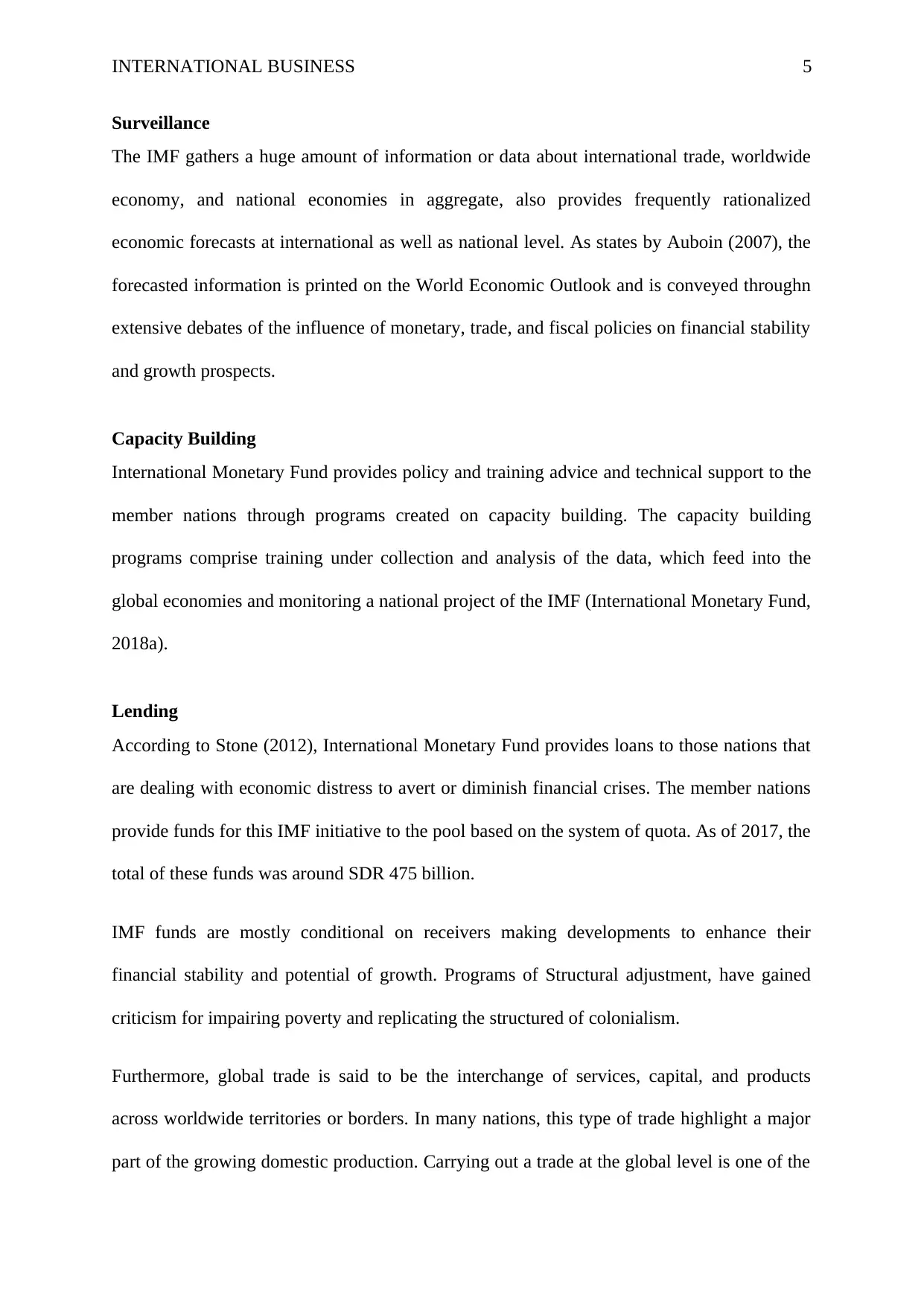
INTERNATIONAL BUSINESS 5
Surveillance
The IMF gathers a huge amount of information or data about international trade, worldwide
economy, and national economies in aggregate, also provides frequently rationalized
economic forecasts at international as well as national level. As states by Auboin (2007), the
forecasted information is printed on the World Economic Outlook and is conveyed throughn
extensive debates of the influence of monetary, trade, and fiscal policies on financial stability
and growth prospects.
Capacity Building
International Monetary Fund provides policy and training advice and technical support to the
member nations through programs created on capacity building. The capacity building
programs comprise training under collection and analysis of the data, which feed into the
global economies and monitoring a national project of the IMF (International Monetary Fund,
2018a).
Lending
According to Stone (2012), International Monetary Fund provides loans to those nations that
are dealing with economic distress to avert or diminish financial crises. The member nations
provide funds for this IMF initiative to the pool based on the system of quota. As of 2017, the
total of these funds was around SDR 475 billion.
IMF funds are mostly conditional on receivers making developments to enhance their
financial stability and potential of growth. Programs of Structural adjustment, have gained
criticism for impairing poverty and replicating the structured of colonialism.
Furthermore, global trade is said to be the interchange of services, capital, and products
across worldwide territories or borders. In many nations, this type of trade highlight a major
part of the growing domestic production. Carrying out a trade at the global level is one of the
Surveillance
The IMF gathers a huge amount of information or data about international trade, worldwide
economy, and national economies in aggregate, also provides frequently rationalized
economic forecasts at international as well as national level. As states by Auboin (2007), the
forecasted information is printed on the World Economic Outlook and is conveyed throughn
extensive debates of the influence of monetary, trade, and fiscal policies on financial stability
and growth prospects.
Capacity Building
International Monetary Fund provides policy and training advice and technical support to the
member nations through programs created on capacity building. The capacity building
programs comprise training under collection and analysis of the data, which feed into the
global economies and monitoring a national project of the IMF (International Monetary Fund,
2018a).
Lending
According to Stone (2012), International Monetary Fund provides loans to those nations that
are dealing with economic distress to avert or diminish financial crises. The member nations
provide funds for this IMF initiative to the pool based on the system of quota. As of 2017, the
total of these funds was around SDR 475 billion.
IMF funds are mostly conditional on receivers making developments to enhance their
financial stability and potential of growth. Programs of Structural adjustment, have gained
criticism for impairing poverty and replicating the structured of colonialism.
Furthermore, global trade is said to be the interchange of services, capital, and products
across worldwide territories or borders. In many nations, this type of trade highlight a major
part of the growing domestic production. Carrying out a trade at the global level is one of the
⊘ This is a preview!⊘
Do you want full access?
Subscribe today to unlock all pages.

Trusted by 1+ million students worldwide
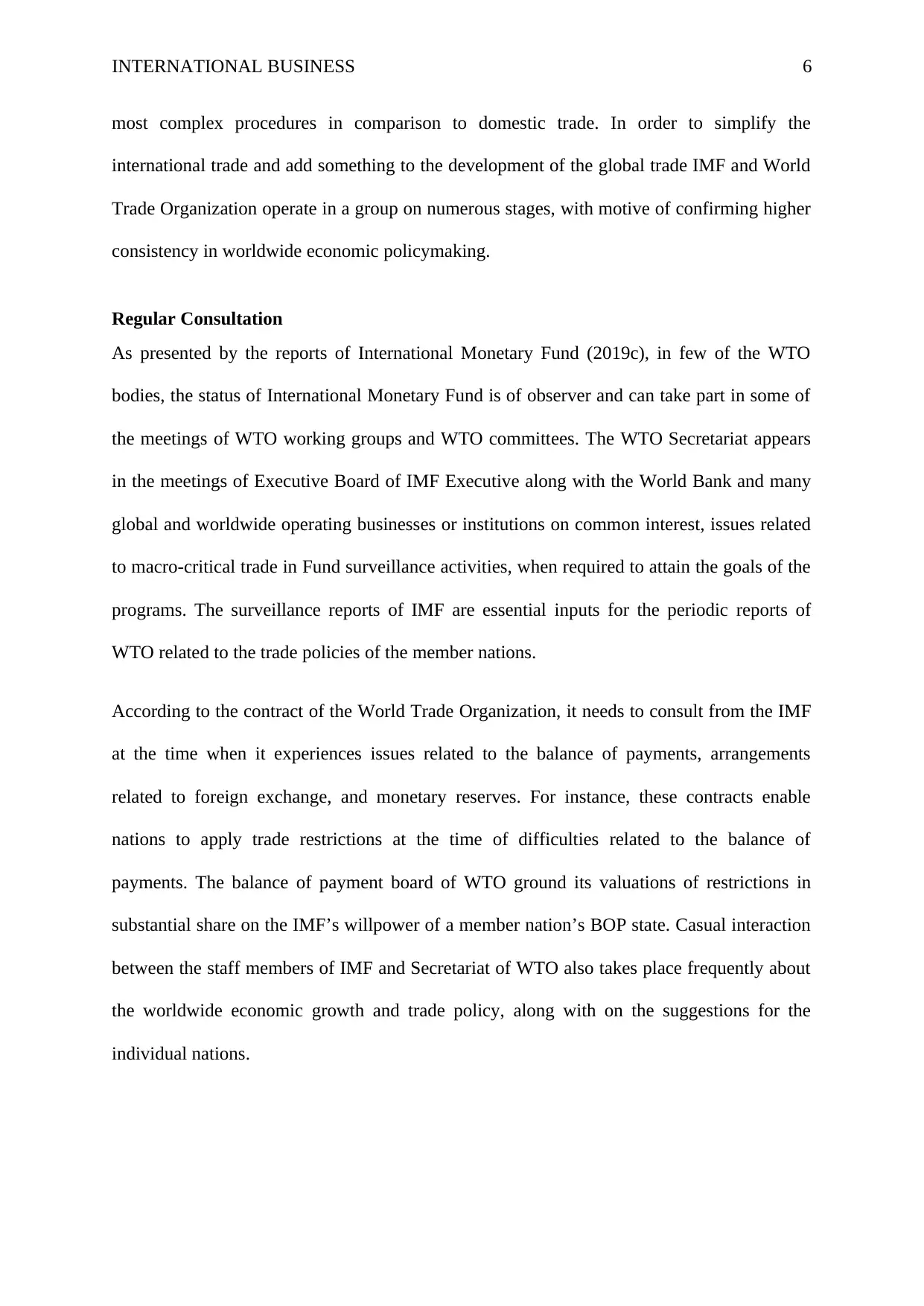
INTERNATIONAL BUSINESS 6
most complex procedures in comparison to domestic trade. In order to simplify the
international trade and add something to the development of the global trade IMF and World
Trade Organization operate in a group on numerous stages, with motive of confirming higher
consistency in worldwide economic policymaking.
Regular Consultation
As presented by the reports of International Monetary Fund (2019c), in few of the WTO
bodies, the status of International Monetary Fund is of observer and can take part in some of
the meetings of WTO working groups and WTO committees. The WTO Secretariat appears
in the meetings of Executive Board of IMF Executive along with the World Bank and many
global and worldwide operating businesses or institutions on common interest, issues related
to macro-critical trade in Fund surveillance activities, when required to attain the goals of the
programs. The surveillance reports of IMF are essential inputs for the periodic reports of
WTO related to the trade policies of the member nations.
According to the contract of the World Trade Organization, it needs to consult from the IMF
at the time when it experiences issues related to the balance of payments, arrangements
related to foreign exchange, and monetary reserves. For instance, these contracts enable
nations to apply trade restrictions at the time of difficulties related to the balance of
payments. The balance of payment board of WTO ground its valuations of restrictions in
substantial share on the IMF’s willpower of a member nation’s BOP state. Casual interaction
between the staff members of IMF and Secretariat of WTO also takes place frequently about
the worldwide economic growth and trade policy, along with on the suggestions for the
individual nations.
most complex procedures in comparison to domestic trade. In order to simplify the
international trade and add something to the development of the global trade IMF and World
Trade Organization operate in a group on numerous stages, with motive of confirming higher
consistency in worldwide economic policymaking.
Regular Consultation
As presented by the reports of International Monetary Fund (2019c), in few of the WTO
bodies, the status of International Monetary Fund is of observer and can take part in some of
the meetings of WTO working groups and WTO committees. The WTO Secretariat appears
in the meetings of Executive Board of IMF Executive along with the World Bank and many
global and worldwide operating businesses or institutions on common interest, issues related
to macro-critical trade in Fund surveillance activities, when required to attain the goals of the
programs. The surveillance reports of IMF are essential inputs for the periodic reports of
WTO related to the trade policies of the member nations.
According to the contract of the World Trade Organization, it needs to consult from the IMF
at the time when it experiences issues related to the balance of payments, arrangements
related to foreign exchange, and monetary reserves. For instance, these contracts enable
nations to apply trade restrictions at the time of difficulties related to the balance of
payments. The balance of payment board of WTO ground its valuations of restrictions in
substantial share on the IMF’s willpower of a member nation’s BOP state. Casual interaction
between the staff members of IMF and Secretariat of WTO also takes place frequently about
the worldwide economic growth and trade policy, along with on the suggestions for the
individual nations.
Paraphrase This Document
Need a fresh take? Get an instant paraphrase of this document with our AI Paraphraser
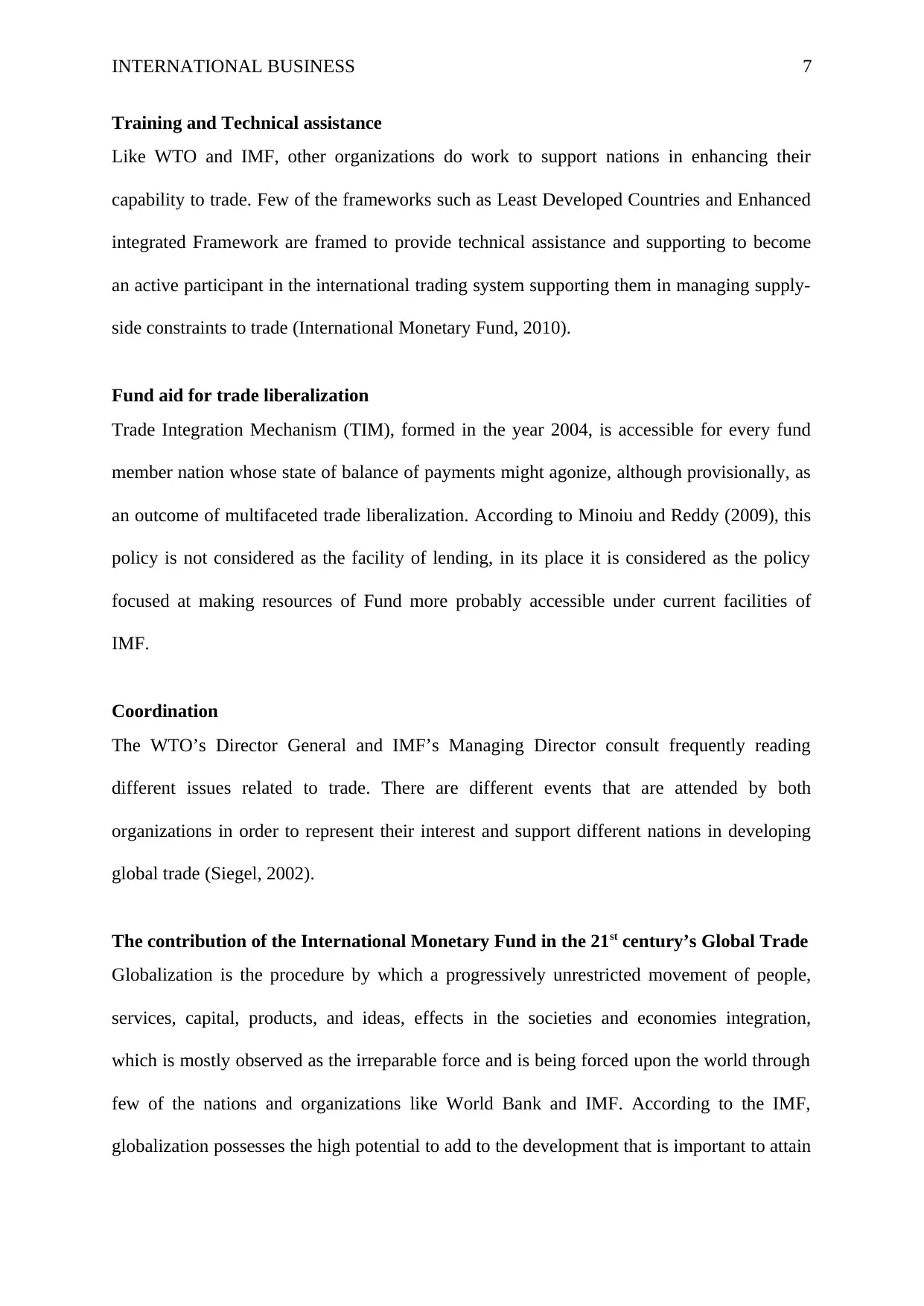
INTERNATIONAL BUSINESS 7
Training and Technical assistance
Like WTO and IMF, other organizations do work to support nations in enhancing their
capability to trade. Few of the frameworks such as Least Developed Countries and Enhanced
integrated Framework are framed to provide technical assistance and supporting to become
an active participant in the international trading system supporting them in managing supply-
side constraints to trade (International Monetary Fund, 2010).
Fund aid for trade liberalization
Trade Integration Mechanism (TIM), formed in the year 2004, is accessible for every fund
member nation whose state of balance of payments might agonize, although provisionally, as
an outcome of multifaceted trade liberalization. According to Minoiu and Reddy (2009), this
policy is not considered as the facility of lending, in its place it is considered as the policy
focused at making resources of Fund more probably accessible under current facilities of
IMF.
Coordination
The WTO’s Director General and IMF’s Managing Director consult frequently reading
different issues related to trade. There are different events that are attended by both
organizations in order to represent their interest and support different nations in developing
global trade (Siegel, 2002).
The contribution of the International Monetary Fund in the 21st century’s Global Trade
Globalization is the procedure by which a progressively unrestricted movement of people,
services, capital, products, and ideas, effects in the societies and economies integration,
which is mostly observed as the irreparable force and is being forced upon the world through
few of the nations and organizations like World Bank and IMF. According to the IMF,
globalization possesses the high potential to add to the development that is important to attain
Training and Technical assistance
Like WTO and IMF, other organizations do work to support nations in enhancing their
capability to trade. Few of the frameworks such as Least Developed Countries and Enhanced
integrated Framework are framed to provide technical assistance and supporting to become
an active participant in the international trading system supporting them in managing supply-
side constraints to trade (International Monetary Fund, 2010).
Fund aid for trade liberalization
Trade Integration Mechanism (TIM), formed in the year 2004, is accessible for every fund
member nation whose state of balance of payments might agonize, although provisionally, as
an outcome of multifaceted trade liberalization. According to Minoiu and Reddy (2009), this
policy is not considered as the facility of lending, in its place it is considered as the policy
focused at making resources of Fund more probably accessible under current facilities of
IMF.
Coordination
The WTO’s Director General and IMF’s Managing Director consult frequently reading
different issues related to trade. There are different events that are attended by both
organizations in order to represent their interest and support different nations in developing
global trade (Siegel, 2002).
The contribution of the International Monetary Fund in the 21st century’s Global Trade
Globalization is the procedure by which a progressively unrestricted movement of people,
services, capital, products, and ideas, effects in the societies and economies integration,
which is mostly observed as the irreparable force and is being forced upon the world through
few of the nations and organizations like World Bank and IMF. According to the IMF,
globalization possesses the high potential to add to the development that is important to attain
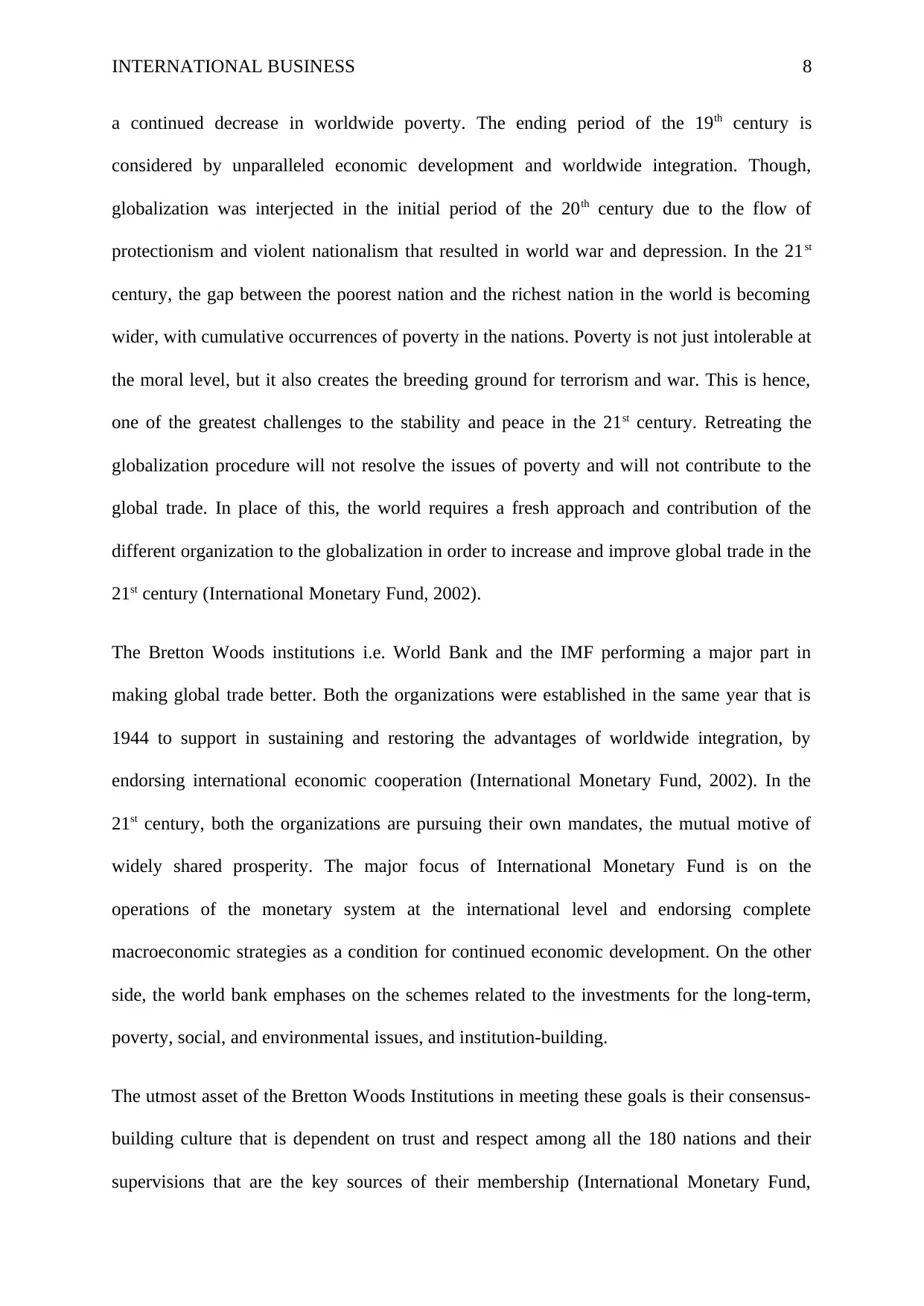
INTERNATIONAL BUSINESS 8
a continued decrease in worldwide poverty. The ending period of the 19th century is
considered by unparalleled economic development and worldwide integration. Though,
globalization was interjected in the initial period of the 20th century due to the flow of
protectionism and violent nationalism that resulted in world war and depression. In the 21st
century, the gap between the poorest nation and the richest nation in the world is becoming
wider, with cumulative occurrences of poverty in the nations. Poverty is not just intolerable at
the moral level, but it also creates the breeding ground for terrorism and war. This is hence,
one of the greatest challenges to the stability and peace in the 21st century. Retreating the
globalization procedure will not resolve the issues of poverty and will not contribute to the
global trade. In place of this, the world requires a fresh approach and contribution of the
different organization to the globalization in order to increase and improve global trade in the
21st century (International Monetary Fund, 2002).
The Bretton Woods institutions i.e. World Bank and the IMF performing a major part in
making global trade better. Both the organizations were established in the same year that is
1944 to support in sustaining and restoring the advantages of worldwide integration, by
endorsing international economic cooperation (International Monetary Fund, 2002). In the
21st century, both the organizations are pursuing their own mandates, the mutual motive of
widely shared prosperity. The major focus of International Monetary Fund is on the
operations of the monetary system at the international level and endorsing complete
macroeconomic strategies as a condition for continued economic development. On the other
side, the world bank emphases on the schemes related to the investments for the long-term,
poverty, social, and environmental issues, and institution-building.
The utmost asset of the Bretton Woods Institutions in meeting these goals is their consensus-
building culture that is dependent on trust and respect among all the 180 nations and their
supervisions that are the key sources of their membership (International Monetary Fund,
a continued decrease in worldwide poverty. The ending period of the 19th century is
considered by unparalleled economic development and worldwide integration. Though,
globalization was interjected in the initial period of the 20th century due to the flow of
protectionism and violent nationalism that resulted in world war and depression. In the 21st
century, the gap between the poorest nation and the richest nation in the world is becoming
wider, with cumulative occurrences of poverty in the nations. Poverty is not just intolerable at
the moral level, but it also creates the breeding ground for terrorism and war. This is hence,
one of the greatest challenges to the stability and peace in the 21st century. Retreating the
globalization procedure will not resolve the issues of poverty and will not contribute to the
global trade. In place of this, the world requires a fresh approach and contribution of the
different organization to the globalization in order to increase and improve global trade in the
21st century (International Monetary Fund, 2002).
The Bretton Woods institutions i.e. World Bank and the IMF performing a major part in
making global trade better. Both the organizations were established in the same year that is
1944 to support in sustaining and restoring the advantages of worldwide integration, by
endorsing international economic cooperation (International Monetary Fund, 2002). In the
21st century, both the organizations are pursuing their own mandates, the mutual motive of
widely shared prosperity. The major focus of International Monetary Fund is on the
operations of the monetary system at the international level and endorsing complete
macroeconomic strategies as a condition for continued economic development. On the other
side, the world bank emphases on the schemes related to the investments for the long-term,
poverty, social, and environmental issues, and institution-building.
The utmost asset of the Bretton Woods Institutions in meeting these goals is their consensus-
building culture that is dependent on trust and respect among all the 180 nations and their
supervisions that are the key sources of their membership (International Monetary Fund,
⊘ This is a preview!⊘
Do you want full access?
Subscribe today to unlock all pages.

Trusted by 1+ million students worldwide
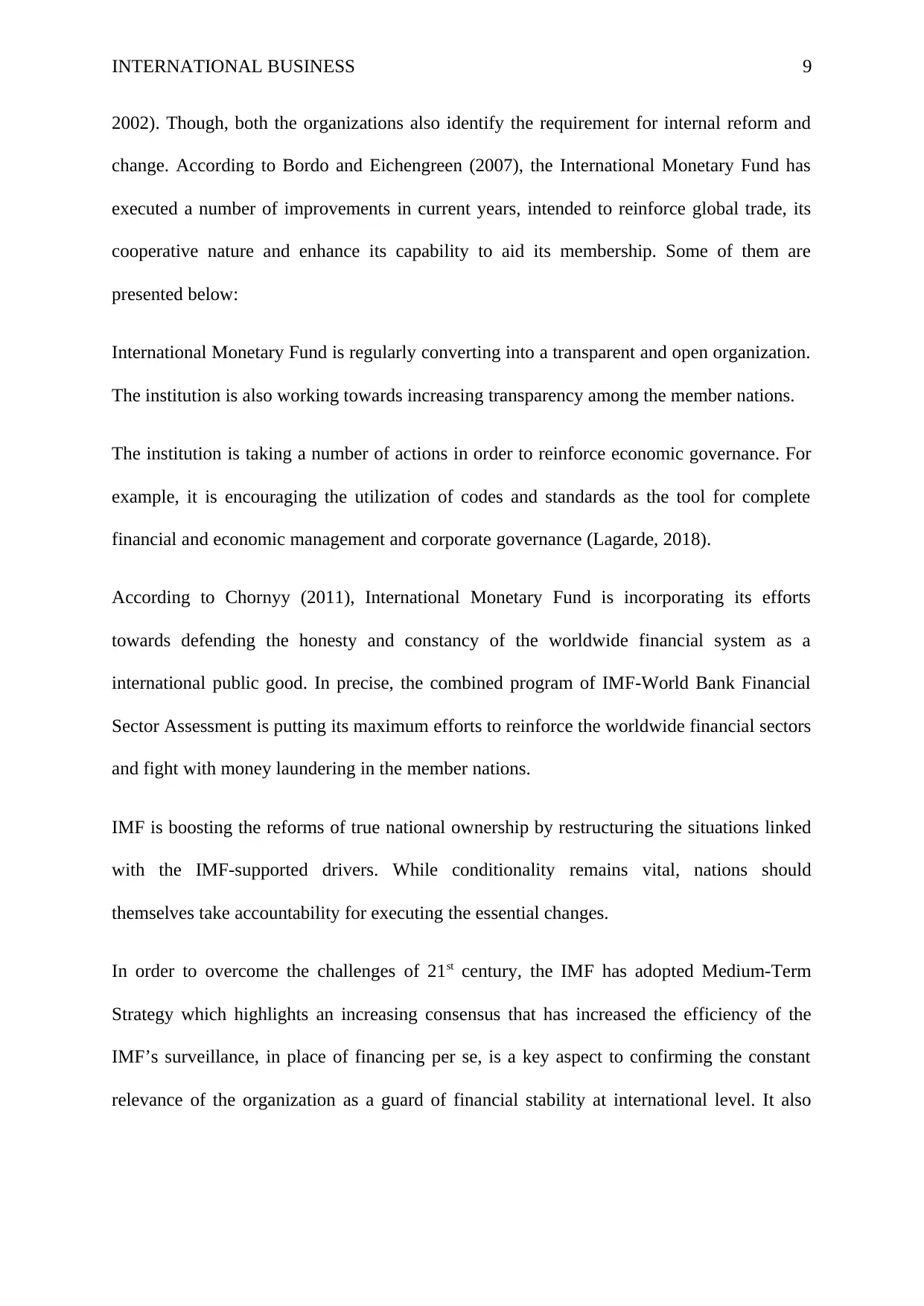
INTERNATIONAL BUSINESS 9
2002). Though, both the organizations also identify the requirement for internal reform and
change. According to Bordo and Eichengreen (2007), the International Monetary Fund has
executed a number of improvements in current years, intended to reinforce global trade, its
cooperative nature and enhance its capability to aid its membership. Some of them are
presented below:
International Monetary Fund is regularly converting into a transparent and open organization.
The institution is also working towards increasing transparency among the member nations.
The institution is taking a number of actions in order to reinforce economic governance. For
example, it is encouraging the utilization of codes and standards as the tool for complete
financial and economic management and corporate governance (Lagarde, 2018).
According to Chornyy (2011), International Monetary Fund is incorporating its efforts
towards defending the honesty and constancy of the worldwide financial system as a
international public good. In precise, the combined program of IMF-World Bank Financial
Sector Assessment is putting its maximum efforts to reinforce the worldwide financial sectors
and fight with money laundering in the member nations.
IMF is boosting the reforms of true national ownership by restructuring the situations linked
with the IMF-supported drivers. While conditionality remains vital, nations should
themselves take accountability for executing the essential changes.
In order to overcome the challenges of 21st century, the IMF has adopted Medium-Term
Strategy which highlights an increasing consensus that has increased the efficiency of the
IMF’s surveillance, in place of financing per se, is a key aspect to confirming the constant
relevance of the organization as a guard of financial stability at international level. It also
2002). Though, both the organizations also identify the requirement for internal reform and
change. According to Bordo and Eichengreen (2007), the International Monetary Fund has
executed a number of improvements in current years, intended to reinforce global trade, its
cooperative nature and enhance its capability to aid its membership. Some of them are
presented below:
International Monetary Fund is regularly converting into a transparent and open organization.
The institution is also working towards increasing transparency among the member nations.
The institution is taking a number of actions in order to reinforce economic governance. For
example, it is encouraging the utilization of codes and standards as the tool for complete
financial and economic management and corporate governance (Lagarde, 2018).
According to Chornyy (2011), International Monetary Fund is incorporating its efforts
towards defending the honesty and constancy of the worldwide financial system as a
international public good. In precise, the combined program of IMF-World Bank Financial
Sector Assessment is putting its maximum efforts to reinforce the worldwide financial sectors
and fight with money laundering in the member nations.
IMF is boosting the reforms of true national ownership by restructuring the situations linked
with the IMF-supported drivers. While conditionality remains vital, nations should
themselves take accountability for executing the essential changes.
In order to overcome the challenges of 21st century, the IMF has adopted Medium-Term
Strategy which highlights an increasing consensus that has increased the efficiency of the
IMF’s surveillance, in place of financing per se, is a key aspect to confirming the constant
relevance of the organization as a guard of financial stability at international level. It also
Paraphrase This Document
Need a fresh take? Get an instant paraphrase of this document with our AI Paraphraser
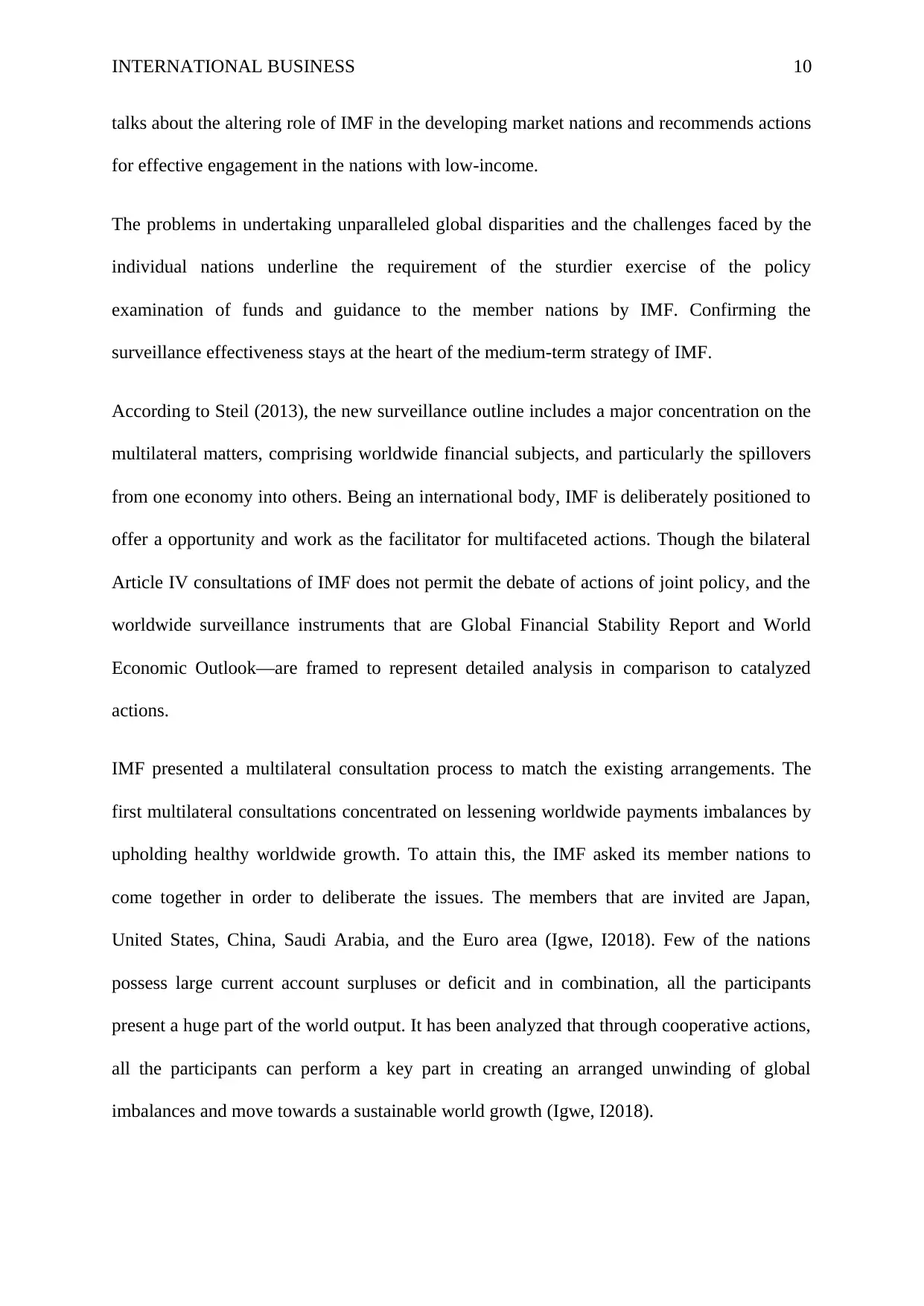
INTERNATIONAL BUSINESS 10
talks about the altering role of IMF in the developing market nations and recommends actions
for effective engagement in the nations with low-income.
The problems in undertaking unparalleled global disparities and the challenges faced by the
individual nations underline the requirement of the sturdier exercise of the policy
examination of funds and guidance to the member nations by IMF. Confirming the
surveillance effectiveness stays at the heart of the medium-term strategy of IMF.
According to Steil (2013), the new surveillance outline includes a major concentration on the
multilateral matters, comprising worldwide financial subjects, and particularly the spillovers
from one economy into others. Being an international body, IMF is deliberately positioned to
offer a opportunity and work as the facilitator for multifaceted actions. Though the bilateral
Article IV consultations of IMF does not permit the debate of actions of joint policy, and the
worldwide surveillance instruments that are Global Financial Stability Report and World
Economic Outlook—are framed to represent detailed analysis in comparison to catalyzed
actions.
IMF presented a multilateral consultation process to match the existing arrangements. The
first multilateral consultations concentrated on lessening worldwide payments imbalances by
upholding healthy worldwide growth. To attain this, the IMF asked its member nations to
come together in order to deliberate the issues. The members that are invited are Japan,
United States, China, Saudi Arabia, and the Euro area (Igwe, I2018). Few of the nations
possess large current account surpluses or deficit and in combination, all the participants
present a huge part of the world output. It has been analyzed that through cooperative actions,
all the participants can perform a key part in creating an arranged unwinding of global
imbalances and move towards a sustainable world growth (Igwe, I2018).
talks about the altering role of IMF in the developing market nations and recommends actions
for effective engagement in the nations with low-income.
The problems in undertaking unparalleled global disparities and the challenges faced by the
individual nations underline the requirement of the sturdier exercise of the policy
examination of funds and guidance to the member nations by IMF. Confirming the
surveillance effectiveness stays at the heart of the medium-term strategy of IMF.
According to Steil (2013), the new surveillance outline includes a major concentration on the
multilateral matters, comprising worldwide financial subjects, and particularly the spillovers
from one economy into others. Being an international body, IMF is deliberately positioned to
offer a opportunity and work as the facilitator for multifaceted actions. Though the bilateral
Article IV consultations of IMF does not permit the debate of actions of joint policy, and the
worldwide surveillance instruments that are Global Financial Stability Report and World
Economic Outlook—are framed to represent detailed analysis in comparison to catalyzed
actions.
IMF presented a multilateral consultation process to match the existing arrangements. The
first multilateral consultations concentrated on lessening worldwide payments imbalances by
upholding healthy worldwide growth. To attain this, the IMF asked its member nations to
come together in order to deliberate the issues. The members that are invited are Japan,
United States, China, Saudi Arabia, and the Euro area (Igwe, I2018). Few of the nations
possess large current account surpluses or deficit and in combination, all the participants
present a huge part of the world output. It has been analyzed that through cooperative actions,
all the participants can perform a key part in creating an arranged unwinding of global
imbalances and move towards a sustainable world growth (Igwe, I2018).
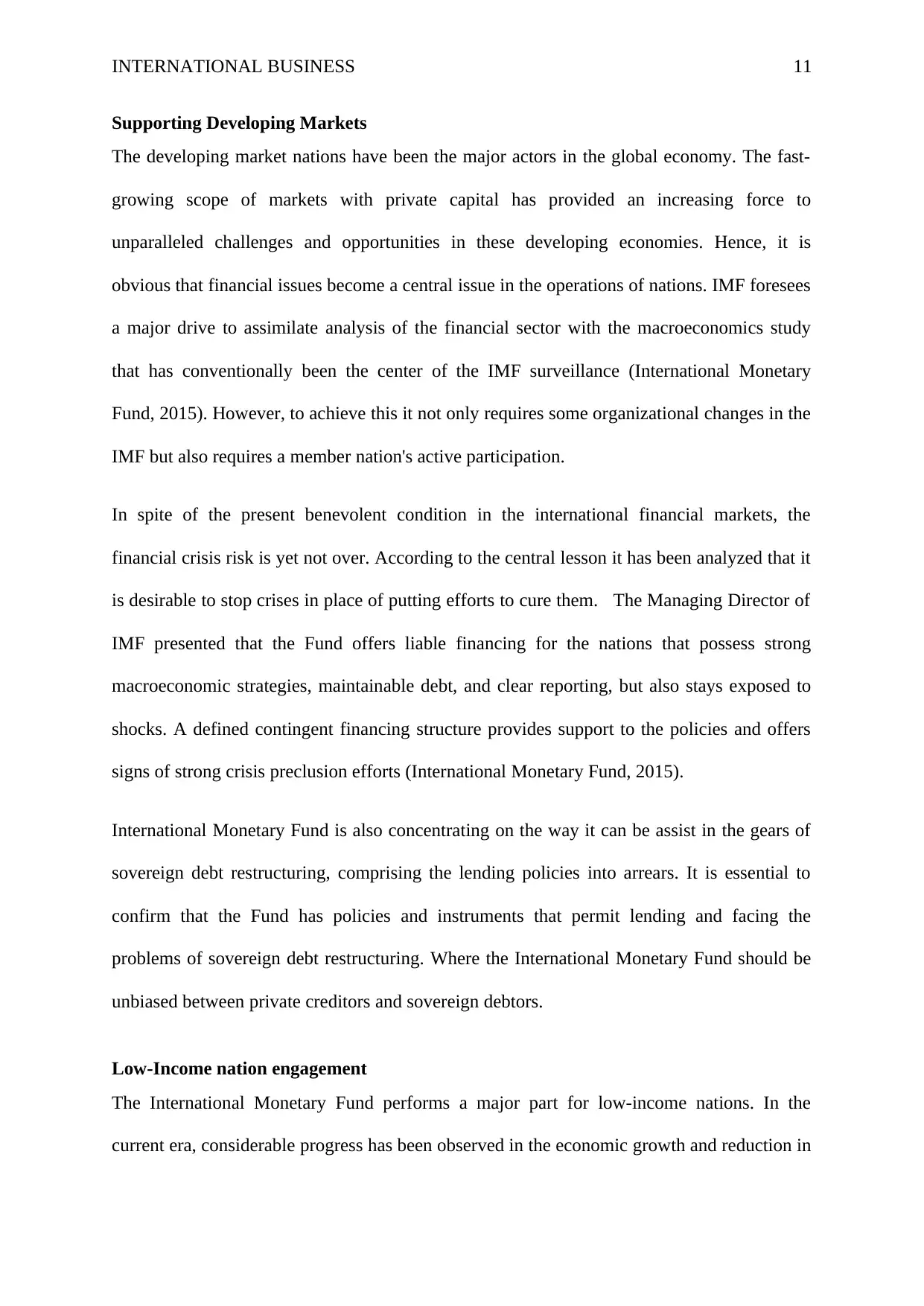
INTERNATIONAL BUSINESS 11
Supporting Developing Markets
The developing market nations have been the major actors in the global economy. The fast-
growing scope of markets with private capital has provided an increasing force to
unparalleled challenges and opportunities in these developing economies. Hence, it is
obvious that financial issues become a central issue in the operations of nations. IMF foresees
a major drive to assimilate analysis of the financial sector with the macroeconomics study
that has conventionally been the center of the IMF surveillance (International Monetary
Fund, 2015). However, to achieve this it not only requires some organizational changes in the
IMF but also requires a member nation's active participation.
In spite of the present benevolent condition in the international financial markets, the
financial crisis risk is yet not over. According to the central lesson it has been analyzed that it
is desirable to stop crises in place of putting efforts to cure them. The Managing Director of
IMF presented that the Fund offers liable financing for the nations that possess strong
macroeconomic strategies, maintainable debt, and clear reporting, but also stays exposed to
shocks. A defined contingent financing structure provides support to the policies and offers
signs of strong crisis preclusion efforts (International Monetary Fund, 2015).
International Monetary Fund is also concentrating on the way it can be assist in the gears of
sovereign debt restructuring, comprising the lending policies into arrears. It is essential to
confirm that the Fund has policies and instruments that permit lending and facing the
problems of sovereign debt restructuring. Where the International Monetary Fund should be
unbiased between private creditors and sovereign debtors.
Low-Income nation engagement
The International Monetary Fund performs a major part for low-income nations. In the
current era, considerable progress has been observed in the economic growth and reduction in
Supporting Developing Markets
The developing market nations have been the major actors in the global economy. The fast-
growing scope of markets with private capital has provided an increasing force to
unparalleled challenges and opportunities in these developing economies. Hence, it is
obvious that financial issues become a central issue in the operations of nations. IMF foresees
a major drive to assimilate analysis of the financial sector with the macroeconomics study
that has conventionally been the center of the IMF surveillance (International Monetary
Fund, 2015). However, to achieve this it not only requires some organizational changes in the
IMF but also requires a member nation's active participation.
In spite of the present benevolent condition in the international financial markets, the
financial crisis risk is yet not over. According to the central lesson it has been analyzed that it
is desirable to stop crises in place of putting efforts to cure them. The Managing Director of
IMF presented that the Fund offers liable financing for the nations that possess strong
macroeconomic strategies, maintainable debt, and clear reporting, but also stays exposed to
shocks. A defined contingent financing structure provides support to the policies and offers
signs of strong crisis preclusion efforts (International Monetary Fund, 2015).
International Monetary Fund is also concentrating on the way it can be assist in the gears of
sovereign debt restructuring, comprising the lending policies into arrears. It is essential to
confirm that the Fund has policies and instruments that permit lending and facing the
problems of sovereign debt restructuring. Where the International Monetary Fund should be
unbiased between private creditors and sovereign debtors.
Low-Income nation engagement
The International Monetary Fund performs a major part for low-income nations. In the
current era, considerable progress has been observed in the economic growth and reduction in
⊘ This is a preview!⊘
Do you want full access?
Subscribe today to unlock all pages.

Trusted by 1+ million students worldwide
1 out of 17
Related Documents
Your All-in-One AI-Powered Toolkit for Academic Success.
+13062052269
info@desklib.com
Available 24*7 on WhatsApp / Email
![[object Object]](/_next/static/media/star-bottom.7253800d.svg)
Unlock your academic potential
Copyright © 2020–2026 A2Z Services. All Rights Reserved. Developed and managed by ZUCOL.





